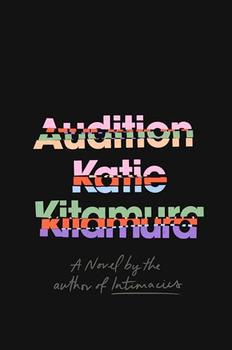Summary | Excerpt | Reviews | Beyond the book | Read-Alikes | Genres & Themes | Author Bio

A Novel
by Katie KitamuraKatie Kitamura's novels share an unadorned narrative style. Beautiful and spare, the writing can be deceptively straightforward, and there often comes a moment within her novels, an almost imperceptible twist, when readers suddenly realize that they have been subtly directed into mysterious, even murky, territory. It is hard to identify the stylistic technique, to figure out how a first-person perspective, conversationally relating a series of neutral-seeming events, can transmute into something so deeply enigmatic. In her newest novel, Audition, Kitamura commits yet another narrative sleight of hand, creating a scaffolding that results in a story more experimental and daring than in her previous books, and perhaps—certainly for those who can accept the challenges of a fluctuating narrative—even more satisfying to read.
Audition opens with an accomplished actress having lunch in a large New York restaurant with Xavier, a handsome young man. She feels uncomfortable with the glances that dart their way, and wonders if people might misconstrue their relationship. But what is their relationship? We learn that Xavier, a stranger to her, had approached her two weeks earlier at the theatre in which she is working on a new play and told her he believed that she might be his birth mother. At the time, she had informed him that this was impossible. Now, however, she reveals to the reader that the two do look quite similar and even share mannerisms. In the restaurant, she looks up and sees her husband unexpectedly appear. He does not seem to see her. She watches as he walks through and then turns and leaves the restaurant. Such oddly disconnected details begin to proliferate, making the scene, while clearly narrated, slightly disorienting to the reader. Who exactly is Xavier? Why does he believe that he is her son? Why is the actress meeting again with him if he is not? Why is her husband at the restaurant? Why does she panic when she sees him? What is not being said?
Kitamura has long explored ideas about language, performance, and identity. Her previous two novels, Intimacies and A Separation, also featured unnamed women protagonists, one a literary translator and the other an interpreter at the Hague. In both novels, the women find themselves in countries foreign to them and grapple with feelings of alienation and dislocation. These earlier novels also appear simple and straightforward in their writing style, but as the main character in Intimacies notes, "The appearance of simplicity is not the same thing as simplicity itself." Audition wrestles with a similar constellation of concerns.
The actress is deep into the process of preparing for a new theatrical production. It is a major role, and the play is divided into two very different parts. She is grappling with how to approach an important transitional scene that comes between the two acts: "There are always two stories taking place at once, the narrative inside the play and the narrative around it, and the boundary between the two is more porous than you might think, that is both the danger and the excitement of the performance." And here is where Kitamura pulls the rug out from under the reader's feet. Like the two-act play that the actress is working on, the book's first act and second act are very different. But here in the novel, unlike in the play, there is no transition that brings the two bookends into harmony.
The second section of the novel opens with the same cast of characters, but the configuration has been changed, and relationships now contradict the information given in the first half. Here as well, the reader quickly recognizes that the first-person perspective is slowly transforming from straightforward to slightly strange to completely unhinged. The actress is the same person, and yet she is not the same. We begin to wonder how much of her narration, if any, is reliable. Who can be trusted? Which part of the book is telling the "truth"? The reader must put aside all expectation and follow Kitamura through an increasingly astounding narrative landscape. Eventually, a coda provides a possible breadcrumb for the reader struggling to find a clear path. We see that there may be new performance possibilities that we had not considered. This novel will challenge and delight readers willing to set aside their desire to be perpetually orientated. The payoff is a novel that dives deep into the question of whether any of us ever step off the stage.
![]() This review
first ran in the April 9, 2025
issue of BookBrowse Recommends.
This review
first ran in the April 9, 2025
issue of BookBrowse Recommends.

If you liked Audition, try these:

by Danzy Senna
Published 2025
A brilliant dark comedy about love and ambition, failure and reinvention, and the racial- identity-industrial complex from the bestselling author of Caucasia.

by Hari Kunzru
Published 2025
From one of the sharpest voices in fiction today, a profound and enthralling novel about beauty and power, capital, art and those who devote their lives to creating it
There are two kinds of people in the world: those who divide the world into two kinds of people, and those who don'...
Click Here to find out who said this, as well as discovering other famous literary quotes!
Your guide toexceptional books
BookBrowse seeks out and recommends the best in contemporary fiction and nonfiction—books that not only engage and entertain but also deepen our understanding of ourselves and the world around us.